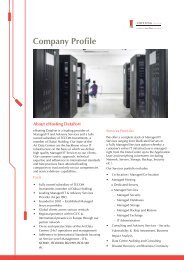Connecting with Cloud by eHDF
a valuable heated debate by eHDF
a valuable heated debate by eHDF
Create successful ePaper yourself
Turn your PDF publications into a flip-book with our unique Google optimized e-Paper software.
CLOUD COMPUTING<br />
Abraham: Cost and<br />
scalability benefits<br />
are driving private<br />
cloud adoption.<br />
hen it comes to cloud<br />
technology, the<br />
landscape is changing<br />
across the Middle<br />
East. Organisations<br />
all over the GCC are<br />
seeing the significant<br />
inroads cloud is making<br />
globally, and are<br />
beginning to embrace<br />
it, <strong>with</strong> analysts expecting<br />
heavy uptake<br />
to take place over the<br />
next four years.<br />
“Private cloud<br />
solutions will show<br />
strong growth driven<br />
<strong>by</strong> the benefits of<br />
cost and scalability,”<br />
says Rajesh Abraham, director, Product Development, eHosting<br />
DataFort. “According to industry research, in 2013, cloud services<br />
in MENA are expected to grow rapidly in some countries, specifically<br />
Saudi Arabia (43%) and UAE (40%).”<br />
For many enterprises, the solutions they’re focusing on are<br />
around private cloud; in part due to a lack of public cloud providers<br />
but also security and data privacy concerns. Plus, <strong>with</strong> the fact<br />
that many enterprises in the Middle East have already embraced<br />
IT infrastructure virtualisation, they are well positioned to deploy<br />
private cloud.<br />
“Companies are increasingly aware that private cloud technology<br />
goes beyond virtualisation, hence the adoption is starting to<br />
increase rapidly. The uptake of private cloud in the Middle East is<br />
‘patchy’ however, which means that in each industry – such as oil<br />
and gas, healthcare, or finance - there are some organisations completely<br />
adopting private cloud technology, while others are still<br />
evaluating whether it is the best fit for them,” notes Kevin Harris,<br />
enterprise technologist, <strong>Cloud</strong> Computing, at Dell EMEA Emerging<br />
Markets.<br />
“This growing interest in cloud, especially private cloud, has<br />
contributed to the large-scale adoption of virtualisation we’ve<br />
seen across the UAE,” adds Sony John, research manager for IT<br />
services at IDC Middle East, Africa, and Turkey. “However, only<br />
a handful of organisations have gone the full distance in terms of<br />
converting these highly virtualised environments to fully-fledged<br />
private cloud deployments. This is due to a variety of factors,<br />
including general misconceptions around the two concepts, and a<br />
lack of clarity on the benefits of going for a fully automated, fully<br />
metered private cloud.”<br />
Indeed there is some confusion as to what exactly a private<br />
cloud solution is, as Meera Kaul, managing director of Optimus<br />
highlights. Here she explains what a true private cloud environment<br />
should entail.<br />
“COMPANIES ARE INCREAS-<br />
INGLY AWARE THAT PRIVATE<br />
CLOUD TECHNOLOGY GOES BE-<br />
YOND VIRTUALISATION, HENCE<br />
THE ADOPTION IS STARTING<br />
TO INCREASE RAPIDLY.”<br />
60 ARABIAN COMPUTER NEWS May 2013





